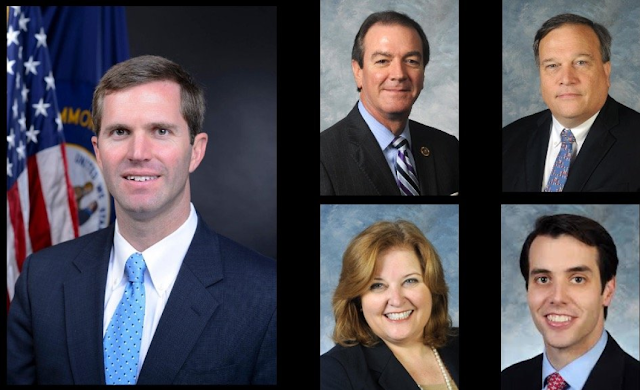Stivers says emergency-power limits won’t be aimed at Beshear, but Osborne says effort will ‘turn political’; governor stoutly objects

Beshear and (clockwise) Osborne, Stivers, McGarvey and Jenkins
—–
By Al Cross and Melissa Patrick
Kentucky Health News
The legislature’s planned changes in the governor’s emergency powers will address “an institutional situation, not an individual situation” like Gov. Andy Beshear’s ongoing mandates during the coronavirus pandemic, Senate President Robert Stivers said on the eve of the 2021 session.
But House Speaker David Osborne said “This is one of those things that inherently turns political,” and Beshear continued to object strongly to the legislature’s plans and characterize them as politically motivated.
Beshear, a Democrat facing a legislature with huge Republican majorities, reiterated Monday night that reducing his emergency powers while the virus is surging and hospitals are filling up, and the state is deploying vaccines, “would not only be a shame, it would be a tragedy.”
“It would basically be surrendering when victory is insight, and it will cost people their lives,” he said.
“Instead of fighting with each other or trying to pull power from here or there, how about we work together to provide real relief to those that have had to sacrifice more than others. To our small businesses, our restaurants, those that have had to give up even more than most, those that have waited for unemployment far too long — why don’t we work together to help those individuals instead of fighting each other?” Beshear asked.
Asked by host Renee Shaw what the Senate has in mind, Stivers said it will limit the extent and duration of the governor’s emergency powers. For example, some bills would require legislative approval of orders beyond 28 days.
Senate Democratic Leader Morgan McGarvey said he hoped Stivers was “not talking about any individual” and that the legislation was not aimed politically at the Democratic governor.
“I totally agree,” Stivers said. “This is an institutional situation, not an individual situation.” But he added that what McGarvey fears will be “probably something the House is going to introduce.”
Some House members have said the legislature should repeal the governor’s powers to close businesses during a pandemic, and some have proposed impeaching Beshear, which would put him on trial in the Senate for removal from office. He called that “silly.”
House Democratic Leader Joni Jenkins said, “We have to be very, very careful that we’re not reacting or overcorrecting from what may be unpopular choices that the governor made.”
To that, Osborne said, “This is one of those things that inherently turns political . . . We do need a strong executive . . . and those emergency powers are very, very important to the successful operation of government, but that doesn’t mean they’re unlimited.”
Already, lawmakers have pre-filed six bills that would limit the governor’s executive powers, five in the House of Representatives and one in the Senate. And while they all offer some version of calling the General Assembly back into session if the governor issues an emergency order that last between 14 and 30 days, Sen. Chris McDaniel’s bill stands out because it calls for amending the state’s constitution, which would require Kentuckians approval via a vote in 2022.
McDaniel called it a “belt and suspenders approach, with the constitution being one and the statutes being another.”
“They get paid every day they’re in,” he said. “This legislature would be in every single day trying to run every aspect of the state. You want to talk about an idea that would allow people to enrich themselves every single day with no check on them, that would be it. But I tell you what, if they want to put that on the ballot, I think they should. Because I think the people of Kentucky will speak very loud and clear that a legislature shouldn’t be able to pay themselves for more days if they can’t get what they need to get done done in the session.”